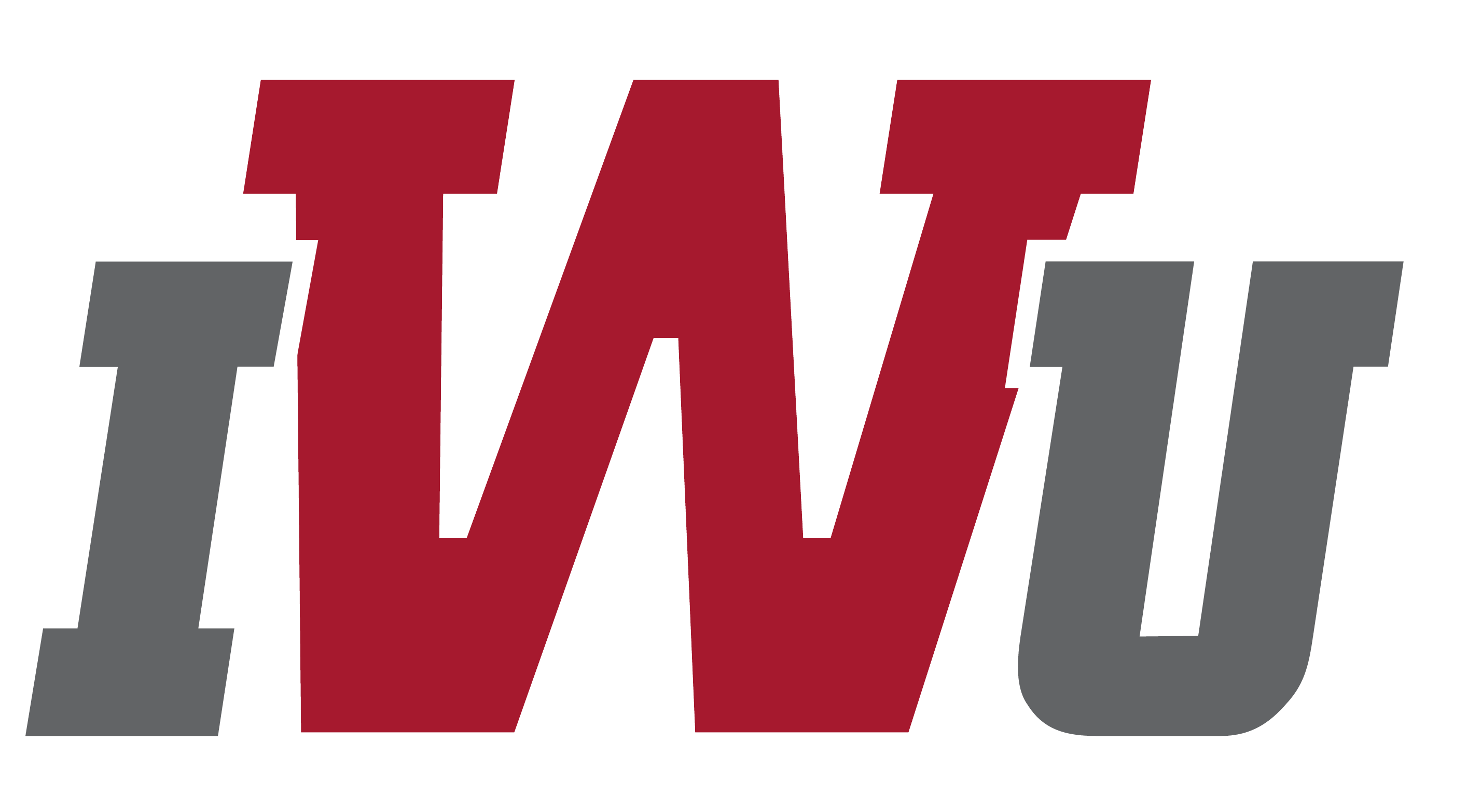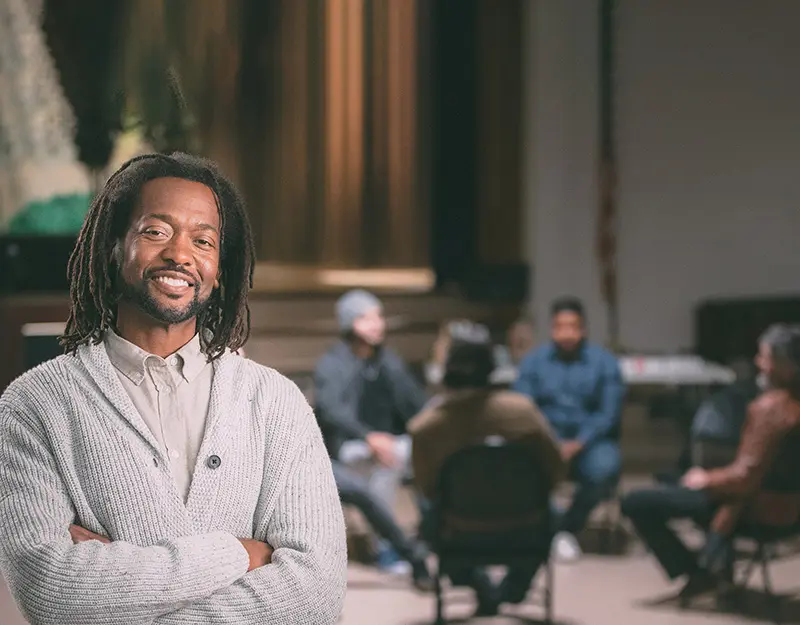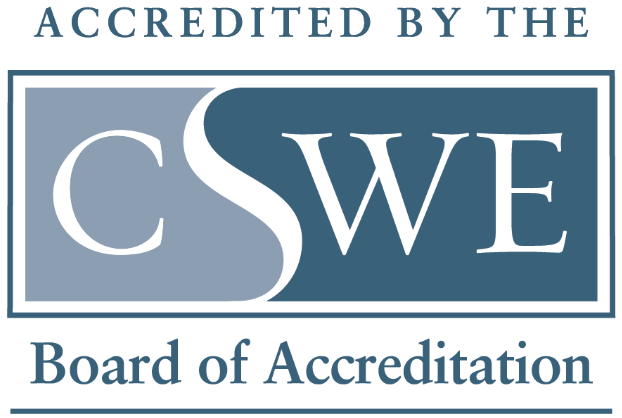 Online M.S.W. Degree - Advanced
Next Start |
Request Info
Apply Now
Online M.S.W. Degree - Advanced
Next Start |
Request Info
Apply Now
If you want to pursue a career as a therapist, program director, or case manager in a social services context, earning your master’s degree in social work at Indiana Wesleyan University could propel you toward your goal. In less than two years, you can develop the clinical skills to work in advanced social work careers. Discover how IWU helps students achieve their professional goals in a flexible, faith-based learning environment.
Why Pursue My Master of Social Work at IWU?
There are several benefits to pursuing your online master’s in social work at IWU. We offer accredited degree programs taught by experienced faculty who are experts in the topics they teach. Our Christian faculty teach from the same biblical worldview valued on our campus, so that students can implement these principles in a fulfilling career. We also provide student services, from tech support to tutoring, to help you succeed in this Master of Social Work program. Our approach to online learning allows busy professionals and parents to continue their careers without putting their current lives on hold. Plus, we lock in the rate of your tuition once you begin the program.
What Will I Learn in This Advanced Track M.S.W. Online Program?
This online master’s in social work program is designed to help students gain the knowledge and theory needed to work with diverse populations in a global context. This advanced track program is designed for students who already have their undergraduate degree from an accredited social work program. Students engage in career-focused projects that reflect real-world scenarios. Course materials are delivered through virtual reality, video discussion, concept maps, demo videos, and other tech-driven applications. Course topics cover mental health and psychopathology, working with families and groups, leadership, and more.
What Makes IWU Different?
IWU has provided education for more than 100 years.
Christ-centered support, resources, and services to online students, staff and faculty.
Discover online student resources to help along your journey.
Financial aid is available in the form of grants, loans, scholarships, veterans’ benefits, and employer reimbursement.
The curriculum for this master’s degree in social work advanced track program covers how to:

These courses contain the program-specific knowledge. Upon completion, you should have the tools to conquer your new career with confidence. For a full list of courses required to complete your degree, please visit the course catalog. Click on a course below to view the description.
SWK-650,SWK-655,SWK-661,SWK-656,SWK-662,SWK-665,SWK-666,SWK-667,SWK-668,SWK-669
As part of a Christian University, the MSW program at Indiana Wesleyan is committed to helping students to explore the meaning of the Christian faith and the value of a Biblical worldview in social work practice.


Field Education is a vital component of completing the MSW program with Indiana Wesleyan University. The Council on Social Work Education considers Field Education the signature pedagogy of social work education as it allows students to apply knowledge, values, and skills in practice to achieve competency as a Master’s level social worker.

In accordance with CSWE standards, it is the policy of the IWU MSW Program that students are not given credit for life experience or previous work experience
Students whose GPA falls below 3.0 will be placed on academic probation and are given two consecutive courses to satisfactorily raise their GPA. The GPA is reviewed after the second course, and if it has been successfully raised, the probationary status is removed. Academic suspension will result if the student's GPA is not successfully raised.
Academic suspension will result if a student fails to clear the academic probationary status within the probationary period of two consecutive courses. The suspension will occur once the grades have been recorded in the Registrar's Office. Students will be notified of the academic suspension in writing. Application for readmission may be made after six months. The application must be made in writing to the MSW Program Director.
Upon a second academic suspension in the MSW program, a student is dismissed from the university, and no longer eligible to earn the MSW degree.
Students are expected to complete the course requirements by the last class session. There may be
instances when crisis circumstances or events prevent the student from completing the course requirements in a timely manner. In these rare situations, a grade of "I" (incomplete) may be issued but only after completing the following process:
However, the issuance of an incomplete cannot be given if the student fails to meet the engagement policy. Because "incompletes" are granted only for extenuating circumstances, the student’s grade will not be penalized.
A student with more than one incomplete on record is subject to academic suspension.
Gatekeeping and professional performance review of students in the MSW program occurs throughout the program. While each part of the curriculum is designed to evaluate knowledge, skills, values, and behaviors, there are several points at which particular focused evaluation occurs.
Review Points:
Field education is an educationally directed and supervised planned learning experience which gives the student the opportunity to apply and refine knowledge, values, and skills learned in Human Behavior and the Social Environment, Social Welfare Policy and Services, Social Research, and Social Work Practice courses. Field is the key integrative component towards which all other sequenced learning is directed and from which classroom learning is assessed and refined. Through field experience, students will have the following opportunities:
Field Practicum at Indiana Wesleyan University is a vital component of the student’s MSW program. According to the CSWE Educational Policy 3.32.2, field education is the signature pedagogy of Social Work professional program development. “Field education is designed to integrate the theoretical and conceptual contributions of the explicit curriculum in the field setting” (p. 20). (CSWE, 2022 Educational Policy and
Accreditation Standards). Students under appropriate supervision and consultation can apply the skills, knowledge, and values of the profession to real life situations in social service agencies working with individuals, families, groups, organizations, and communities in their local community. Students have the opportunity to apply the generalist model in the Generalist year (for standard track students) and advanced practice skills in the advanced generalist year in assessing, planning, contracting, implementing, evaluating, and terminating various client systems.
The IWU MSW program provides goal-directed education with specifically designed curriculum content and outcomes, to facilitate conceptualization and stimulation of the student’s cognitive processes. It is therefore a logical sequence for the field experience to come after significant coursework developing social work knowledge, skills, values, cognitive, and affective processes is completed. Placements assist students in experiencing a variety of delivery systems as well as models and methods for delivery. The student is given the opportunity to conceptualize the “whole” person-in-situation. The student will review and experience agency policies, the larger social welfare system, and social work practice as a possible focus of change. The integration of the class and field experience, the signature pedagogy, provides the venue for students to begin the process of developing into social work practitioners who are capable of entry level and advanced clinical social work practice.
Due to the importance of assessing readiness for field practicum,students are required to complete the Social Work Field Education Application and be accepted for moving forward into the Field Experience component for both the generalist and advanced generalist specialty practice years. Applications are due three months prior to the beginning of the first field seminar. The purpose of the Field Education Application is to identify practical information and set professional and academic goals. The MSW Director of Field Experiences will contact each student prior to the field placement to initiate the process of application and placement. Students will identify field placement options and a tentative plan will be created for Field Placement based on student interest and needs. While student desires are considered, the final approval of a placement is the responsibility of the Director of Field Experiences.
Students in their generalist year complete a minimum of 400 hours of field education (average of 12.5 hours per week) in a generalist social work practice setting. Field practicum hours are completed in conjunction with four seminar courses, each lasting eight weeks. Courses include SWK-560, SWK-561, SWK-562, and SWK-563. The placement is at one agency and is complete when 32 weeks and 400 hours are completed. Students must complete 100 hours during each eight-week field seminar to continue in their practicum.
Students in the advanced generalist practice specialization year complete a minimum of 500 hours of field education (average of 15.5 hours per week) in a social work practice setting. Field practicum hours are completed in conjunction with four advanced field placement and seminar courses, each lasting eight weeks. Courses include SWK-666, SWK-667, SWK-668, and SWK-669. The placement is in one agency and is complete when 32 weeks and 500 hours are completed. Students must complete 125 hours during each eight-week field seminar to continue in their practicum.
Each field seminar course in the Generalist and Advanced Generalist specialty practice year also contains a pass/fail component that the student must pass to continue in the program including evaluations of professional behavior and evaluations of competency at mid-point and end of field placement. Students who drop out of or receive a grade of a “C- or below in a Field Seminar may retake the field course only upon approval of the Director of Field Experiences after review of satisfactory professional performance of the student in the field placement. Students repeating a field seminar course are also require start over in completing the required hours and assignments for the seminar. The s process of approval to return to field may also include additional review of completed seminar assignments, progress on learning contract activities, and feedback from the Faculty Liaison and Field Instructor.
Formal evaluation of professional performance occurs when a professional performance issue has been identified and brought to the MSW program faculty. The faculty use a Rubric for Assessing Professional Behavior that operationalizes the following twelve professional performance behaviors: attendance; punctuality; respect; self-awareness; diversity awareness; collegiality; oral communication; written communication; initiative; reliability; responsiveness to feedback; compliance with professional requirements of the program, and; compliance with NASW Code of Ethics.
The following Student Professional Performance Policy and Procedures has been included in the MSW Student Handbook to inform students of the criteria for evaluating their professional performance.
Students who violate ethical standards of practice established by NASW in the Code of Ethics, whose professional performance affects their ability to be licensed as a social worker, and/or who do not meet the practice behaviors established by CSWE, may be recommended for a Performance Improvement Plan (PIP) to offer the opportunity to correct the identified behaviors. Students who do not meet goals as detailed in a Performance Improvement Plan will be terminated from the Social Work Program.
Performance concerns may include, but are not limited to the following:
To remain in the MSW program, students must maintain a 3.0 GPA, must pass all courses with a minimum of a "C," successfully pass all the seminar courses, complete required field hours and pass the field performance evaluation based on required established scores indicated in the manual for field education. If a student receives below a "C" in a course, he or she may re-take the course but may not move on in the program until successfully passing the course.
It is the desire of the MSW faculty that students admitted to the program will continue in the program and graduate. However, there are circumstances that could lead to dismissal from the MSW program. Some violations may include but are not limited to:
In the event of any of the above violations, the MSW Program Director in consultation with Social Work faculty may require outside evaluations and/or opinions of professionals as is deemed necessary to determine the most appropriate course of actions. Each situation is treated individually, and the student may appeal any decision that is made.
As a result of violations of program policy such as those identified above, the MSW Faculty Committee may
recommend to the Dean that the student be dismissed from the program. Students may appeal the decision and may be given the opportunity to complete an improvement plan or other means of remediation . However, failure to follow through with the intervention/remediation plan will result in a denial of the appeal and dismissal. Significant violations of MSW program policy or the Code of Ethics can result in immediate administrative withdrawal from courses and recommendation for dismissal to the Dean with no remediation/improvement plan.
Students may contest academic and professional review decisions through the grievance process. The purpose of the grievance procedure is to ensure that students are being treated fairly and that their rights have not been violated. In accordance with the academic grievance policies outlined in the University Catalog and established by the University and College of Adult and Professional Studies(CAPS), within which the MSW program is housed, students may use the following appeal and grievance procedures if they feel their rights have been violated: Grade Appeal and Academic Policy Grievance.
Within the MSW program, students may also report a grievance of any kind according to the following process.
IWU recognizes and fulfills its obligations under the Americans with Disabilities Act of 1990 (ADA), the Rehabilitation Act of 1973, and similar state laws. IWU is committed to providing reasonable accommodations to qualified disabled learners in university programs and activities as are required by applicable law. See Services for Disabled Students.

Indiana Wesleyan University is accredited by The Higher Learning Commission (HLC), www.hlcommission.org, 312-263-0456. Other accreditations and associations of Indiana Wesleyan University are available at www.indwes.edu/about/iwu-profile/accreditation.

Indiana Wesleyan University's Master of Social Work program is accredited by the Council on Social Work Education's Board of Accreditation.
https://www.cswe.org/accreditation/
Accreditation of a baccalaureate or master’s social work program by the Council on Social Work Education’s Commission on Accreditation indicates that it meets or exceeds criteria for the assessment of program quality evaluated through a peer review process. An accredited program has sufficient resources to meet its mission and goals and the Commission on Accreditation has verified that it demonstrates compliance with all sections of the Educational Policy and Accreditation Standards.
Accreditation applies to all program sites and program delivery methods of an accredited program. Accreditation provides reasonable assurance about the quality of the program and the competence of students graduating from the program.
CSWE Assessment Outcomes
The Mission of the IWU MSW Social Work Program
The mission of the IWU MSW Program is to prepare social work students for advanced social work practice through an emphasis on clinical skills and assist students who desire to integrate personal faith and learning in becoming world changers through service to their fellow human beings. The MSW program is committed to training social workers who embody a global and person-in-environment perspective, demonstrate respect and humility in responding to diversity in their fellow human beings, value scientific inquiry and the pursuit of truth, promote individual and societal justice, uphold inherent human rights, seek to address conditions that limit them, and seek to eliminate poverty and advance the well-being of others.
Further, the MSW program seeks to prepare students who uphold, embody and promote core social work values including service to others, honoring the dignity and worth of all people, acknowledging the importance of human relationships, and valuing personal integrity and competence. The program is committed to creating a personal, professional and innovative experience in the online environment to achieve its mission.
Diversity Statement
IWU, in covenant with God’s reconciling work and in accordance with the Biblical principles of our historic Wesleyan tradition, commits to build a community that reflects Kingdom diversity. We will foster an intentional environment for living, teaching and learning, which exhibits honor, respect, and dignity. Acknowledging visible or invisible differences, our community authentically values each member’s earthly and eternal worth. We refute ignorance and isolation and embrace deliberate and courageous engagement that exhibits Christ’s commandment to love all humankind.”
In this vein, the MSW program is also committed to recruiting and accepting MSW students without regard to “…age, class, color, culture, disability and ability, ethnicity, gender, gender identity and expression, immigration status, marital status, political ideology, race, religion/spirituality, sex, sexual orientation, and tribal sovereign status” (CSWE Educational Policy 3.0 – Diversity), and as thus, the MSW Program has adopted this language.
Note on Licensure
The minimum academic credential required to obtain licensure to practice as a social worker in most states is a Master of Social Work (MSW) from a program accredited by the Council on Social Work Education (CSWE). Indiana Wesleyan University’s MSW program is accredited by CSWE.
State licensing boards are responsible for regulating the practice of social work, and each state has its own academic, licensure, and certification requirements.
IWU recommends that students consult the appropriate social work licensing board in the state in which they plan to practice to determine the specific academic requirements for licensure. It remains the individual’s responsibility to understand, evaluate, and comply with all licensing requirements for the state in which he or she intends to practice. IWU makes no representations or guarantees that completion of its coursework or programs will permit an individual to achieve state licensure, authorization, endorsement, or other state credential as a social worker.